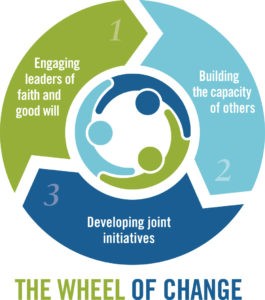
With a background as both a recipient and provider of philanthropic efforts and human services support, I often have wondered how to truly develop the economic capacity and well-being with people on the margins of society. I wrestle with some seemingly contradictory statistics and a puzzling trend in my own community. Specifically, Grand Rapids, Michigan, is consistently rated among the most philanthropic communities in the county1, it also continues to be one of the worst cities in the country for African Americans to live economically.2 Despite all of the supportive efforts that have lauded national recognition, these alone have not proven powerful enough to drive outcomes for the African American community and address systemic issues underlying poverty and racialized outcomes.
Experiencing this juxtaposition has caused me to ask some deeply challenging questions. A friend of mine once told me, “Once a question is raised, it must be addressed.” So I started asking these questions: “What are the frameworks and models that are innovative, sustainable, and affirm dignity to people living on the margins of society? What frameworks are being implemented that work with young people who have aged out of foster care, or are engaged with multiple systems, and create cross-sector solutions?” Unfortunately, the models seemed to be few and far between; so I gathered some folks and we started contextualizing some models that seemed practical and relevant.

Today, we refer to ourselves as a movement—housed within the Grand Rapids Center for Community Transformation (GRCCT) and located in the Madison Square neighborhood. We are a partnership between a business, a church, two social enterprises, and a non-profit organization committed to creating opportunities for transformation through meaningful relationships, work, education, and community development.
GRCCT partners are addressing the lack of accessible employment for young adults and community residents and the lack of structured and consistent approaches to providing inter-agency and cross sectoral opportunities for the community in a sustainable way.
 We work a simple but powerful model that has been developed by Leadership Foundations. With leadership at its core, the Wheel of Change is fueled by three strategic functions – engaging leaders of good faith and good will, building the capacity of others, and developing joint initiatives.
We work a simple but powerful model that has been developed by Leadership Foundations. With leadership at its core, the Wheel of Change is fueled by three strategic functions – engaging leaders of good faith and good will, building the capacity of others, and developing joint initiatives.
Using this approach, the partners renovated 33,000 square feet of a previously abandoned 120-year-old building in a historically disadvantaged neighborhood. In that space GRCCT now provides 400 youth annually with GED/high school completion courses as well as vocational training and certification in landscaping, construction, electrical, masonry, heating, ventilation, and air conditioning. Additionally, on-site case management is provided along with mentorship, housing support, employment skills and a whole host of other workshops and trainings as well as a community-based basketball league for youth.
GRCCT also incubated social enterprises that were designed to move beyond the idea of “poverty alleviation” to the idea of wealth creation. Today there are three business partners; Building Bridges Professional Services, Rising Grinds Cafe and Double 0 Supply and Craftsman providing over 50 full-time jobs for people in the community. As an example of what can happen over time, Building Bridges Professional Services, which started in 2006, now generates one million dollars annually. They maintain over 500 properties, provide significantly reduced rates to low income seniors, and have planted over 1000 trees while employing 25 hard to hire individuals from the community. Rising Grinds Café is a community-driven restaurant that utilizes a quadruple bottom line approach, focusing on people, planet, purpose and profit. Last year it provided employment for five people and vocational training for another eight.
This kind of collaborative success tends to breed even more innovation. We also piloted a new model that integrates the child welfare system, affordable housing, and economic development initiatives. The GRCCT collaborated with an affordable housing developer and received a Low-Income Housing Tax Credit (LIHTC) award to help address the lack of housing options for youth aging out of foster care in the city. More specifically, through these cultivated relationships, the housing development and social services innovation at the local level has become comprehensive and integrated. The result is a Gold LEED certified, mixed-use housing apartment complex in partnership with Inner City Christian Federation (ICCF) offering 24 units with 6 of them for youth who have previously aged out of foster care or have been homeless. This partnership has since been funded to provide another 65 units in which 17 will be for youth aging out of foster care and homeless youth. We hope to see this replicated elsewhere.
In closing let me say, there is nothing magic in all of this, in fact it is a lot of hard work! But, in our experience, we are finding that building relationships between cross-sector decision-makers with a shared vision and a bias for action is a catalyst for the kind of innovation that will drive sustainable change. And that is what truly develops the economic capacity and well-being of people on the margins of society.
 Hear Dr. Justin Beene at this year’s SATtalks, October 24-26
Hear Dr. Justin Beene at this year’s SATtalks, October 24-26
Justin S. Beene is the Founder and Director of the Grand Rapids Center for Community Transformation; a faculty member at Acton University; Vice President of the Board of the Mosaic Christian Community Development Association in Benton Harbor, Ml; and is on the International Advisor y Board for the Center for Transforming Mission in Guatemala City.
Reference Notes
- Raghaven , D. (2013, Sept. 22). Most generous cities. Nerdwallet. Retrieved from https://www.nerdwallet.com / blog/ mortgages/ most-generous-cities/
- Kotkin, J. (2014, Jan. 15) . The cities where African Americans are doing the best. Forbes .Retrieved from https:// www.forbes.com/ sites/joelkotkin / 2015/ 01/ 15/the-cities-where african-americans-are-doing-the-best economically/ 2/# 75a1421a7080
Leave A Comment
You must be logged in to post a comment.